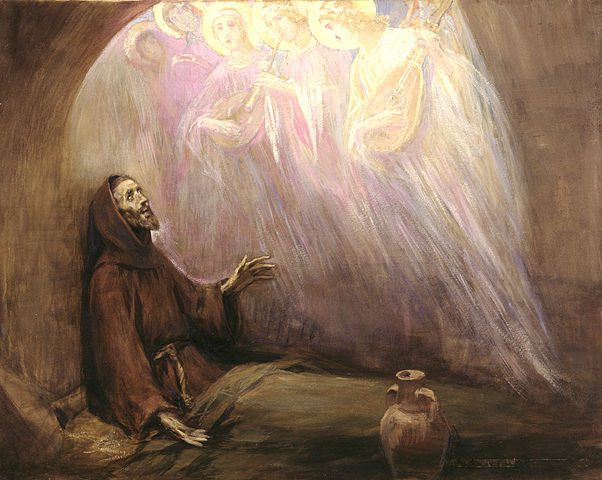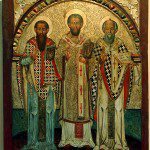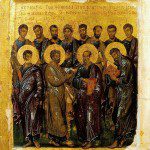
A Choir of Angels Dispels the Sorrows of St. Francis, by Josep Benlliure y Gil (1855-1937) [public domain / Wikimedia Commons]
*****
(1996)
***
Blessed Pope Paul VI, in his Apostolic Constitution on the Revision of Indulgences, of January 1, 1967, made some statements which have relevance to all devotional and pious practices of Catholics, such as the scapular and the Rosary:
To gain indulgences the work prescribed must be done. But that is not all. The faithful must have the dispositions that are necessary. These are that they must love God, hate sin, trust in Christ’s merits, and believe firmly in the great help they obtain from the Communion of Saints. (ch. 4, sec. 10).
In other words, it is not a mere “magic formula,” apart from disposition, holiness, intent, sincerity, etc. Sacramentals (holy water, scapulars, blessings, miraculous medal, genuflection, etc.) work differently than sacraments, which are objectively efficacious (ex opere operato). But even the sacrament of the Eucharist will not have an effect if taken by a person in mortal sin, and priestly absolution is null and void without the prerequisite of true repentance.
The scapular will not “work” — Protestants can rest assured — for a person who neglects holiness and obedience and uses it as a “magic charm” (which is occultic superstition, not Christianity). A piece of cloth cannot rescind the normal, routine duties of the Catholic life. Any Catholic worth his salt knows this. Yet we see – sadly – how many don’t know it. On the other hand, devotional language is usually not meant to be taken literally, any more than love letters of young lovers are (“I’d cross any mountain or river to get to you…..,” etc.).
Likewise, Vatican II stressed active participation in the liturgy:
In order that the liturgy may be able to produce its full effects it is necessary that the faithful come to it with proper dispositions, that their minds be attuned to their voices, and that they cooperate with heavenly grace lest they receive it in vain. Pastors of souls must, therefore, realize that, when the liturgy is celebrated, something more is required than the laws governing valid and lawful celebration. It is their duty also to ensure that the faithful take part fully aware of what they are doing, actively engaged in the rite and enriched by it…….Mother Church earnestly desires that all the faithful should be led to that full, conscious, and active participation in liturgical celebrations which is demanded by the very nature of the liturgy…….In the restoration and promotion of the sacred liturgy the full and active participation by all the people is the aim to be considered above all else, for it is the primary and indispensable source from which the faithful are to derive the true Christian spirit. Therefore, in all their apostolic activity, pastors of souls should energetically set about achieving it through the requisite pedagogy.
(Constitution on the Sacred Liturgy, Dec. 4, 1963, ch. 1, I, sec. 11 and II, sec. 14; emphasis added)
In his booklet The Wonders of the Holy Name (1946; rep. TAN Books, Rockford, IL: 1993), which is about a common devotion known as the “Jesus Prayer” ( a repetition of “Jesus”), Fr. Paul O’Sullivan is quite cognizant of these considerations (they did not begin with Vatican II, after all!). First of all, he grounds the practice in Scripture (Col 3:17), so that it can hardly be objectionable. And he explicitly places it in the context of holiness and gratefulness, so that it is not intended as a charm or magic remedy (p.34):
And in the future, when you say, “Jesus,” remember that you are offering to God all the infinite love and merits of His Son……You cannot offer Him anything holier, anything better, anything more pleasing to Him…… How ungrateful are those Christians who never thank God for all He has done for them …….When you say the Name of Jesus, remember, too, to thank Our Sweet Lord for His Incarnation.
Thus understood, this practice – and by extension, many “sacramental” Catholic practices – are wholly in accord with the Protestant stress, in their doctrine of sanctification, on gratefulness to God for all He has done as a compelling motivation for engaging in good works and becoming more righteous in some sense. And it is the very opposite of a pathetic attitude of treating God like a “vending machine,” as some Protestants put it. If any Catholic does that, he or she is in opposition to clear Catholic teachings, and is in serious sin.
*****
Meta Description: Sacraments and sacramentals are not mere magic charms. They must be accompanied by genuine, sincere, heartfelt piety.
Meta Keywords: piety, reverence, genuine spirituality, authentic spirituality, interior disposition, joy, wholehearted discipleship, religious sincerity, spiritual depth, genuine worship, wholehearted worship, sacraments, magic charms, sacramentalism












